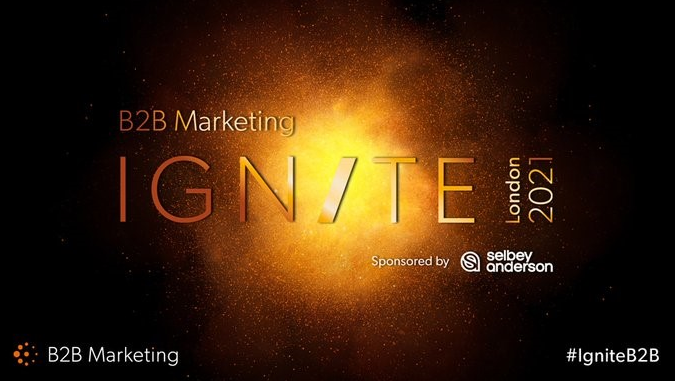For obvious reasons, the B2B Marketing Ignite London event was held virtually again this year – which gave me an opportunity to go and see what all the fuss is about, without even leaving Cornwall.
Ignite is a place where all the big thinkers and experts in the B2B marketing world meet up, network, learn and keep pace with new developments and practices.
And this year, for me, three key themes stood out: likeability, bravery, and the opportunity to boldly go where no B2B brand has gone before.
Amid a packed, two-day schedule, here are my three biggest highlights:
1. Sage “bossing it”, by breaking new ground for B2B
Sage’s Vice President UKI Marketing, Kirsty Waller, opened the keynote sessions with a surprising case study.
You probably know Sage as the safe accountancy software company that makes life that bit easier for small business owners – but Kirsty showed us how Sage’s marketing is anything but safe. She walked us through their groundbreaking “Boss It” campaign, and how she made the decision to boldly go where young entrepreneurs hang out but no B2B brand has gone before: TikTok.
Far from being a gimmick, the #BossIT2021 campaign was an object lesson in doing your research and meeting your customer where they are. Small and medium-sized businesses ran with the idea and revealed, using Sage’s #BossIT2021 theme tune and hashtag, how they’ve been thriving (or “bossing it”) over the last year, to win £5,000 of home office gear.
Sage is clearly “bossing it” too, as the move proved a really popular way to involve SMEs. The results were impressive: 1.3 million hashtag uses, 2 million engagements and 8.5 million impressions.
It demonstrates the potential of TikTok in B2B marketing if you’re bold enough… and if you get the planning right.
2. Social issues: B2B brands need to stop sitting on the fence
Next up, Dara Douglas and Stefan Doering of PwC discussed why B2B brands need to be braver in challenging times. Pandemic, climate change, and global disruption has changed the landscape forever, and B2B marketers must change with it.
Dara and Stefan talked about being less impartial, taking a stand and, most importantly, taking practical action to help solve some of the issues we all face. Playing it safe is no longer an option for B2B brands, and the risk of upsetting some customers – in order to stand up for others – is one worth taking.
They encouraged B2B brands to become more purpose-led, because brands driven by their own, authentic values are best placed to elicit change. That change might be creating more opportunities for people from underrepresented backgrounds, forging a culture of inclusivity (NB: we have a whole podcast about how to make your content more inclusive), being carbon neutral, or deciding not to work with customers who have a detrimental impact on the planet.
They offered some key steps towards becoming an authentic brand with purpose:
- Decide what matters to you, your people, and your customers.
- Walk the talk – so what your organisation presents to the world aligns with what’s inside.
- Empower your people to have their own voice.
- Build a community based on trust and shared values.
This inspiring keynote got me thinking about where we need to take action and what we can do to be braver and more authentic in our marketing. Because however long it takes to go reach a “new normal”, people will always want to work in and with businesses that actually make a difference.
3. People don’t need to love your B2B brand – but they do need to like it
Rooster Punk’s Paul Cash had some fantastic insights into brand likeability and why it matters. As he put it: “People do business with brands and people they like.” Likeability builds trust, which means sales… and repeat sales.
Paul seemed to agree with Dara and Stefan, saying: “People don’t want to buy from you any more, but they do want to buy into you,” and sharing research that shows 81% of people need to be able to trust a brand to do what’s right.
To achieve that, and build a brand that’s likeable, you need to have authentic values, and stand for something real. Or as Paul put it “Stop chasing ‘likes’ and start doing more likeable things.”
The more digital your market, the more customers interact with your brand online before they talk to anyone from your business. So what they see is extremely important. Your brand’s values, and what you stand for, must be obvious – and the content you produce should aim to initiate an emotional response, build a rapport with your customer, and focus on their feelings over any product features.
Paul shared five steps to build a likeable brand. Namely:
- Your brand needs a meaningful purpose, an identity, and a clear, relevant vision.
- Your content must have a point of view, and be interesting, meaningful, and helpful.
- Your culture has to be visible and celebrated.
- Your storytelling should be about people, not products.
- Your marketing needs to harness the power of emotion.
Being likeable is key to customer trust, loyalty and advocacy; clients who like a company enough to recommend it are the golden ticket for any B2B marketer. We need to stop being limited by “business to business”. In B2B, we are all humans who act on our emotions and decide who we want to work with and who we can trust.
Be bold. Be authentic. Be likeable.
For me, the key takeaways from these sessions are that B2B marketers need to deliberately eject ourselves from our comfort zones and try something new. Let’s stop being so afraid to mess up and aim to do things differently.
That might mean taking a stand to win over your stakeholders or challenging the norm by running more provocative, honest or emotional campaigns. On platforms we’ve never used before.
Let’s pick a side, and try to build purpose-led B2B brands that take action to help tackle the societal issues we all face. That might feel risky, but when people perceive your brand as disruptive, diverse, and dynamic, it benefits your organisation, your people, and your marketing.
We can also strive to be likeable. For too long, B2B has been perceived as boring and sterile – but that’s not true. And there’s no reason we can’t be both competent and human, right? That’s allowed. We can shift the focus from products to people. We can have a purpose and embed the power of emotion and storytelling throughout our marketing. And having attended Ignite, I feel fired up to give it a go.
(I might just need a lie-down first…)



